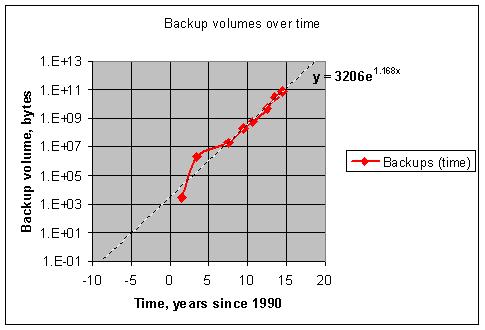Memory and computers
In my life, I had to move from one place to another several times. Quite often
those events were accompanied by moving all my information stored in computers
from one machine to another. With years, volumes of that information grew. The
picture below gives a graphical representation of that process:

It's quite noticeable that the growth was basically exponential, with
information volumes increasing 3 times per each year on average [the black
dashed line represents that tendency].
I tend to think of my files as of my memory. Of course, it is not exactly
mine: I cannot access it while I'm not behind my desk, and searching in files
is not so perfect yet as in my mind. But still, the resemblance is quite
close. My machine stores many essential parts of my individuality and memory,
such as texts of mine, photos of events, music, etc. Sometimes I have to dig
up important files in order to solve real life problems. So in some sense,
that is my memory, and so I treat it.
Accepting that point of view, I'd like to build the following speculations.
Don't take them too seriously, they are just a wild thoughts without a bit of
responsibility behind them :))
1. Extrapolating the growth tendency to the past, I see that it hits 1 byte at
about 1983. Quite interesting is that in about 1984 I've actually became
acquainted with the first "computer" ever in my life, which was a primitive
calculator of my uncle. But is was able to solve arithmetical tasks!
2. According to numerous sources, the speed of conscious perception of
information by humans is about 3-10 bits per second. That speed of information
accumulation was beaten by my backups in 1998.
3. If everything goes as it is now, the volume of my storage will hit 1
Terabyte in 2007.
4. Nobody really knows how big the speed of subconscious information
perception of a human being really is. The boldest estimations put it at 107
bits per second. If current tendency continues, that speed will be beaten by
2010. In other words, I'll become a creature that learns more using his
external memory rather than a "built-in" one ;)
5. Total amount of human's memory is far from being known as well. Different
estimations range from 109 to 1016 bits. Such volumes will be overgrown by my
artificial memory by 2001...2014. That means somewhere in that times range the
moment will come [or actually came already?] when more of my individuality
will be stored on a hard drive rather than in my head :))
6. ...obviously, this can be further extended to the moment in 2020...2034
when my home computer would store more information than is known by the whole
humanity now :)
7. Another [not so related] thought concerns the speeds of computers. In the
last ~50 years, their processors frequencies were growing exponentially as
well, doubling in roughly each 2 years or so. Currently that speed is about
3*109 Hertz [although I'm not really an expert in this field, maybe it's
somewhat different]. However, the frequency of about 1018 Hertz corresponds to
the state where the electromagnetic signal wavelength becomes the same as
inter-atomic distance. Obviously, this is the absolute limit of any
solid-state microelectronics. After that, computers will either stop evolving,
or will have to choose a completely different way of doing it. If current
growth tendency continues, that moment will be hit in about 2030. At that year
[or probably much earlier?] all today's programmers will be faced a tough
choice: either to learn something else besides the programming and leave the
field, or... learn something else which will be the programming in 2030 :))
Not a big secret, though :)